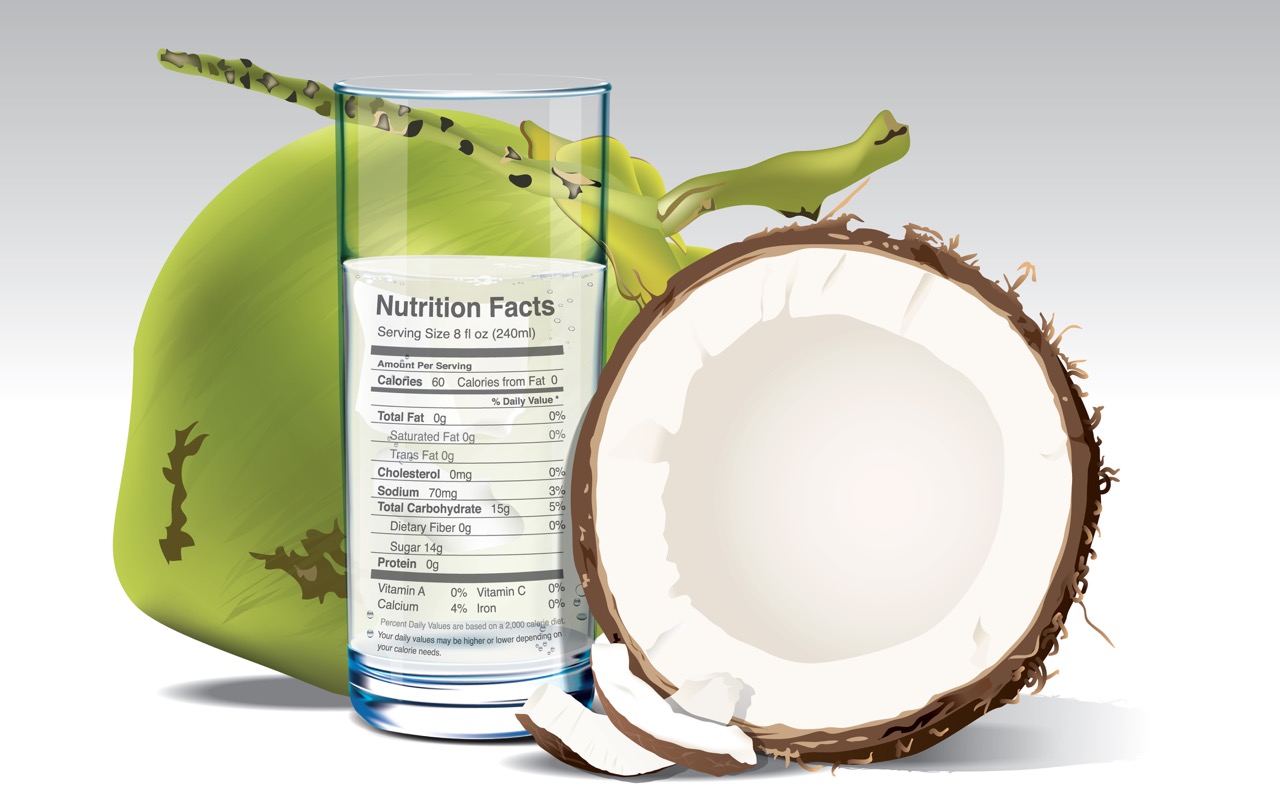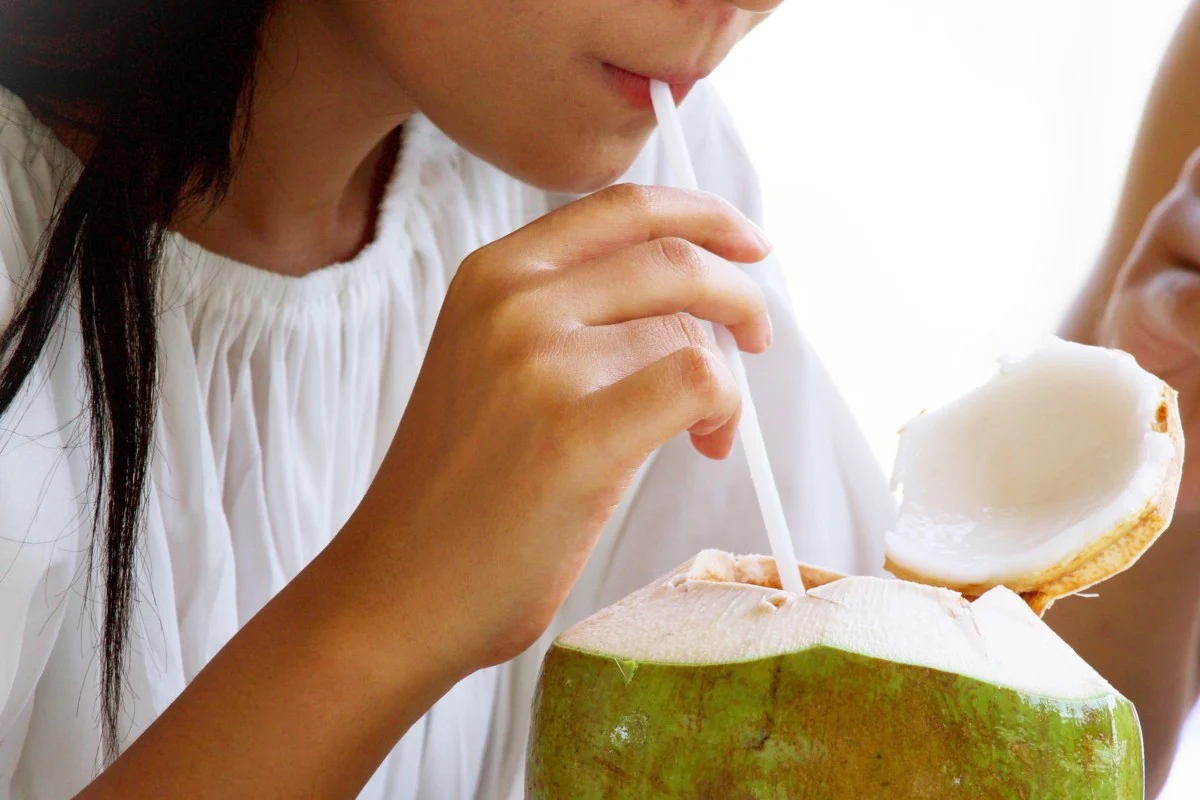In this article, we will explore the coconut water nutrition facts and delve into its various health benefits. Coconut water has gained significant popularity in recent years as a refreshing and hydrating beverage. Not only does it quench your thirst, but it also offers a range of health benefits.
Coconut water nutrition facts
Coconut water is naturally low in calories and fat, making it a healthy choice for hydration. It is also a good source of potassium, which is essential for maintaining proper muscle function and balancing body fluids. Here are the typical nutrition facts for 1 cup (240 ml) of pure, fresh coconut water:
- Calories: 46
- Total Fat: 0 grams
- Saturated Fat: 0 grams
- Trans Fat: 0 grams
- Cholesterol: 0 milligrams
- Sodium: 252 milligrams
- Potassium: 600 milligrams
- Total Carbohydrates: 9 grams
- Dietary Fiber: 3 grams
- Sugars: 6 grams
- Protein: 2 grams
- Vitamin C: 10% of the Daily Value (DV)
- Calcium: 6% of the DV
- Magnesium: 15% of the DV
Carbs: A one-cup serving of coconut water provides about 10 grams of carbohydrate; most of that (about 9 grams) is naturally occurring sugar. Some brands of coconut water are sweetened with added sugars, so check labels carefully if you are looking to limit sugar.
Fats: There is usually little to no fat (less than 1 gram) in coconut water, but some brands may contain a small amount of fat.
Protein: Coconut water contains a small amount of protein; the amount can vary by brand.

Additionally, it provides small amounts of important minerals like calcium and magnesium, as well as some vitamin C. Coconut water is a great alternative to sugary sports drinks or sodas when it comes to rehydration and maintaining electrolyte balance, especially after exercise or in hot weather.
Read more: Coconut Water Vs Coconut Milk: Are They The Same?
How much coconut water can I drink a day?
The amount of coconut water you can safely drink daily depends on your needs, dietary preferences, and specific health conditions. You can refer to the following instructions in some particular cases:
- Dietary preference: Some people may enjoy coconut water as a refreshing beverage and drink a glass or two daily as a substitute for beverages such as soda or fruit juice. Moderate consumption is usually safe if it fits your daily calorie and sugar intake goals.
- Sports Activity: For athletes or individuals participating in intense physical activity, a slightly higher consumption of coconut water may be beneficial for replenishing electrolytes lost through sweat. In such cases, you can consume up to 2-3 glasses daily.
- Pregnancy: If pregnant, you can enjoy coconut water in moderate amounts, about 1-2 cups per day. As with any food or beverage during pregnancy, it is important to consult with a healthcare provider to ensure it is appropriate for your specific health needs.
Coconut water is an excellent natural moisturizer thanks to its electrolyte content. One glass (about 8 ounces or 240 milliliters) per day is enough for most people if you use it primarily for hydration. However, consuming a safe amount of coconut water is one to two cups daily.

Read more: Coconut Water And Aloe Vera Juice: The Perfect Blend For Ramadan
When is the best time to drink coconut water?
With coconut water’s nutritional value, this drink has become extremely popular as a natural and refreshing beverage. Although you can drink it at any time of the day, understanding when to drink coconut water can maximize its effectiveness. Coconut water can be enjoyed in various ways:
- Morning Boost: Kickstart your day with a glass of coconut water for a natural energy boost, thanks to its hydrating properties and high potassium content.
- Pre and Post-Workout: Replenish electrolytes and support muscle recovery by consuming coconut water before and after exercising.
- During Hot Weather: Stay hydrated with coconut water’s natural electrolytes, making it a healthy alternative to sugary drinks in hot weather.
- After Illness: Replenish lost fluids and essential nutrients with coconut water, which is gentle on the stomach and rich in electrolytes.
- Before Bed: Enjoy coconut water to relax muscles, prevent nighttime cramps, and promote better sleep with its high magnesium content.

Some question about coconut water nutrition facts
How many calories in coconut water?
Coconut water is relatively low in calories compared to other beverages. On average, an 8-ounce (240 ml) serving of coconut water contains about 45-60 calories (1 liter contains about 180-240 calories). However, it’s important to note that exact calorie counts may vary slightly. Depending on the brand and maturity of the coconut.
Does coconut water have calories?
Coconut water contains calories. Although this is a relatively low-calorie drink compared to other sugary beverages, it still contributes to your total calorie intake. The exact number of calories in coconut water can vary depending on the variety of coconut and its size.
Is coconut water low in calories?
Coconut water is considered relatively low in calories compared to many other beverages. It is a great choice for those conscious of calorie intake but still want a refreshing and hydrating drink. Coconut water is generally a lower-calorie alternative than sugary sodas or fruit juices.
More than just an ordinary drink, coconut water’s nutritional benefits make it the perfect choice for most people. As a versatile drink, enjoying it at any time of the day can bring many health benefits. Remember to choose fresh, natural coconut water to reap the maximum benefits. Stay hydrated and enjoy the refreshing taste of a natural electrolyte drink!

